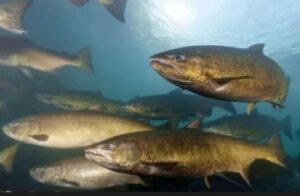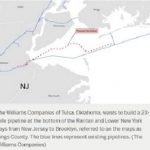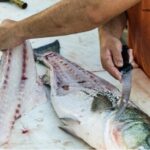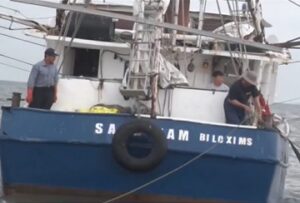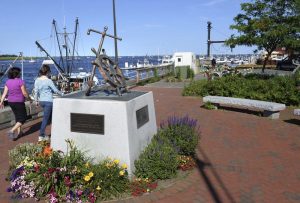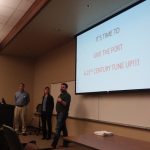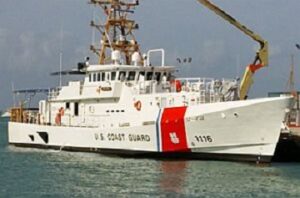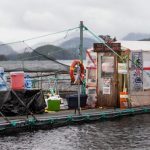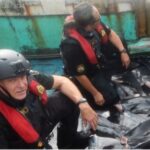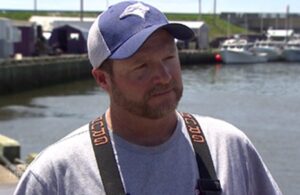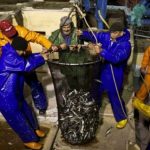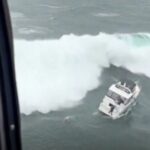Daily Archives: October 28, 2016
New Bedford again tops nation for dollar value of fishing catch
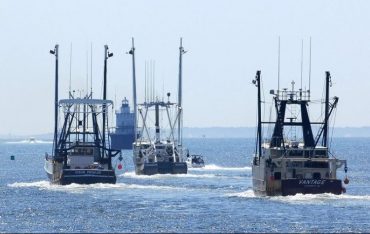 The city’s port has again topped the country for dollar value of its fishing catch, NMFS reported this week, citing 2015 landings worth $322 million. That marks 16 years in a row that New Bedford has held the top-value title, which is thanks largely to scallops. Dutch Harbor, Alaska, again was tops for total volume of catch, landing 787 million pounds last year. “The scallop industry has put New Bedford at the top of the food chain, as it were, of fishing ports for the last 16 years — that’s a very impressive streak,” said Ed Anthes-Washburn, port director for the city’s Harbor Development Commission. “It really shows the impact of scallops but also the impact of cooperative research.” In the 1990s, SMAST scientists Brian Rothschild and Kevin Stokesbury pioneered innovations in counting scallops, with cameras tested and used on local scallopers. The resulting data affected stock assessments by the National Oceanic and Atmospheric Administration (NOAA), ultimately leading to larger catch quotas and helping secure steady catches for waterfront businesses. Read the rest here 19:52
The city’s port has again topped the country for dollar value of its fishing catch, NMFS reported this week, citing 2015 landings worth $322 million. That marks 16 years in a row that New Bedford has held the top-value title, which is thanks largely to scallops. Dutch Harbor, Alaska, again was tops for total volume of catch, landing 787 million pounds last year. “The scallop industry has put New Bedford at the top of the food chain, as it were, of fishing ports for the last 16 years — that’s a very impressive streak,” said Ed Anthes-Washburn, port director for the city’s Harbor Development Commission. “It really shows the impact of scallops but also the impact of cooperative research.” In the 1990s, SMAST scientists Brian Rothschild and Kevin Stokesbury pioneered innovations in counting scallops, with cameras tested and used on local scallopers. The resulting data affected stock assessments by the National Oceanic and Atmospheric Administration (NOAA), ultimately leading to larger catch quotas and helping secure steady catches for waterfront businesses. Read the rest here 19:52
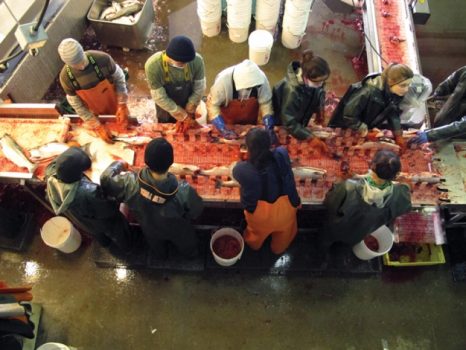
Processors working with harvesters on budget plan
Fish harvesters and processors might not agree on much, but everyone hates taxes. Commercial fishing stakeholders took turns in 2016 tearing apart a commercial fisheries tax plan from Gov. Bill Walker that the Legislature batted around during the marathon session but eventually dropped. The industry has such diverse needs and complex features that the bill couldn’t hit the revenue target without hurting one industry segment more than another. Stakeholders also objected to a holdup with a range of other industry taxes introduced by Walker. As none of the other taxes moved out of committee, House Fisheries Committee Chair Rep. Louise Stutes, R-Kodiak, tabled the fishing taxes until she could be sure the industry wouldn’t take a hit none of the other industry’s would face. Months later, Walker bundled the fisheries tax into a bill with mining and fuel taxes. The bill stalled. Fisheries stakeholders might have a fix. At an October meeting of the United Fishermen of Alaska, the state’s largest harvester group, fishermen decided to knock heads together instead of against the legislative wall. Read the story here 17:44
Ross Sea marine park announced, but concerns linger over expiry date
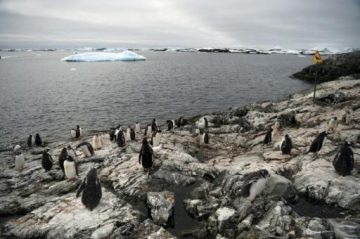 The world’s largest marine protected area will be created in Antarctica’s waters in an global agreement made in Hobart. “It has been clearly established that fully protecting large parts of the ocean is critical to mitigating the effects of climate change”, he said. Ukraine, China and Russian Federation had expressed concerns in the past, with Russian Federation becoming the final holdout before the deal was made. “The Ross Sea Region [Marine Protected Area] will safeguard one of the last unspoiled ocean wilderness areas on the planet ― home to unparalleled marine biodiversity and thriving communities of penguins, seals, whales, seabirds, and fish”, U.S. Secretary of State John Kerry said in a statement. “Seventy-two percent of the MPA will be a “no-take” zone, which forbids all fishing, while other sections will permit some harvesting of fish and krill for scientific research”, the commission explained. There will be a blanket ban on commercial fishing across about three-quarters of that area. Read the rest here 16:28
The world’s largest marine protected area will be created in Antarctica’s waters in an global agreement made in Hobart. “It has been clearly established that fully protecting large parts of the ocean is critical to mitigating the effects of climate change”, he said. Ukraine, China and Russian Federation had expressed concerns in the past, with Russian Federation becoming the final holdout before the deal was made. “The Ross Sea Region [Marine Protected Area] will safeguard one of the last unspoiled ocean wilderness areas on the planet ― home to unparalleled marine biodiversity and thriving communities of penguins, seals, whales, seabirds, and fish”, U.S. Secretary of State John Kerry said in a statement. “Seventy-two percent of the MPA will be a “no-take” zone, which forbids all fishing, while other sections will permit some harvesting of fish and krill for scientific research”, the commission explained. There will be a blanket ban on commercial fishing across about three-quarters of that area. Read the rest here 16:28
Coast Guard conducts multiple rescues off Ocean City, Maryland
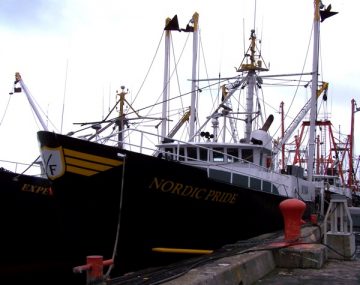 Coast Guard crews rescued two boaters in two separate cases off Ocean City Thursday afternoon. At approximately 12:30 p.m., watchstanders at Coast Guard Sector Maryland-National Capital Region received notification from the 90-foot vessel Instigator of a 64-year-old male suffering from a possible heart attack. A Coast Guard Air Station Elizabeth City, N.C., MH-60 aircrew was diverted from training to rendezvous with the vessel almost 45 miles off Ocean City. At approximately 1:30 p.m., the aircrew hoisted the man from the vessel and brought him to Peninsula Regional Hospital in Salisbury in stable condition. Sector Maryland-NCR watchstanders received a second radio call at 12:40 p.m., from the fishing vessel Nordic Pride of a passenger experiencing pain near his kidneys since 2 a.m. A rescue boatcrew from Coast Guard Station Ocean City, with Ocean City EMS aboard, was launched. At 2:24 p.m., the boatcrew arrived at the vessel’s location 17 miles off Ocean City. The boater was brought aboard and taken back to the Coast Guard station and transferred to awaiting EMS in stable condition. link 11:41
Coast Guard crews rescued two boaters in two separate cases off Ocean City Thursday afternoon. At approximately 12:30 p.m., watchstanders at Coast Guard Sector Maryland-National Capital Region received notification from the 90-foot vessel Instigator of a 64-year-old male suffering from a possible heart attack. A Coast Guard Air Station Elizabeth City, N.C., MH-60 aircrew was diverted from training to rendezvous with the vessel almost 45 miles off Ocean City. At approximately 1:30 p.m., the aircrew hoisted the man from the vessel and brought him to Peninsula Regional Hospital in Salisbury in stable condition. Sector Maryland-NCR watchstanders received a second radio call at 12:40 p.m., from the fishing vessel Nordic Pride of a passenger experiencing pain near his kidneys since 2 a.m. A rescue boatcrew from Coast Guard Station Ocean City, with Ocean City EMS aboard, was launched. At 2:24 p.m., the boatcrew arrived at the vessel’s location 17 miles off Ocean City. The boater was brought aboard and taken back to the Coast Guard station and transferred to awaiting EMS in stable condition. link 11:41
Marine protection for Bay of Fundy pushed by baykeeper
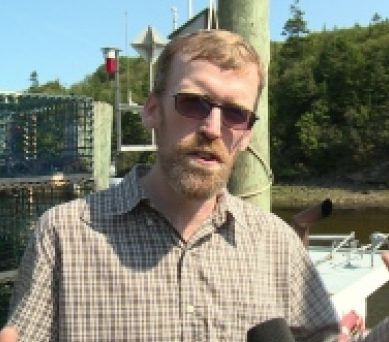 The New Brunswick Conservation Council’s Fundy baykeeper wants to see Ottawa move ahead with plans to designate much of the Bay of Fundy as a marine protected area. Matthew Abbott attended an open house held by the Department of Fisheries and Oceans in St. George on Wednesday and said there were many “lively discussions” about the future of the bay. Sixteen areas which are considered to be ecologically sensitive have been identified by DFO. “There’s quite a cluster of [habitats] in southwest New Brunswick around Grand Manan, Deer Island, Campobello Island and right in … to Passamaquoddy Bay,” Abbott said. “Marine protected areas can be relatively smaller sites spread around or it could be a larger site that has zones. Some places for fishing — maybe a small area where there isn’t fishing.” Read the rest here 10:54
The New Brunswick Conservation Council’s Fundy baykeeper wants to see Ottawa move ahead with plans to designate much of the Bay of Fundy as a marine protected area. Matthew Abbott attended an open house held by the Department of Fisheries and Oceans in St. George on Wednesday and said there were many “lively discussions” about the future of the bay. Sixteen areas which are considered to be ecologically sensitive have been identified by DFO. “There’s quite a cluster of [habitats] in southwest New Brunswick around Grand Manan, Deer Island, Campobello Island and right in … to Passamaquoddy Bay,” Abbott said. “Marine protected areas can be relatively smaller sites spread around or it could be a larger site that has zones. Some places for fishing — maybe a small area where there isn’t fishing.” Read the rest here 10:54
Mackerel fishery closed unexpectedly, leaving some P.E.I. fishermen without enough bait
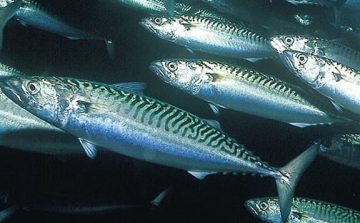 Atlantic Canada’s commercial inshore mackerel fishery closed early for the first time in the fishery’s history, and some Island fishermen don’t have enough bait. The chair responsible for mackerel with the P.E.I. Fishermen’s Association, Chuck White, was shocked when he got the news. “Wow, it’s never been closed before,” said White. He said it’s leaving some fishermen in a tight spot. At least half the fishermen he has spoken with in Eastern P.E.I. don’t have enough bait for next year’s lobster season. “There’s some guys saying they still need some bait, and if the fishery’s closed, not to be reopened, then they’re going to be looking at buying it come spring.” White said it’s much cheaper for fishermen to fish the bait themselves and freeze it over the winter, something many of them do in November. More than 1,200 P.E.I. fishermen catch mackerel commercially. Read the story here 09:24
Atlantic Canada’s commercial inshore mackerel fishery closed early for the first time in the fishery’s history, and some Island fishermen don’t have enough bait. The chair responsible for mackerel with the P.E.I. Fishermen’s Association, Chuck White, was shocked when he got the news. “Wow, it’s never been closed before,” said White. He said it’s leaving some fishermen in a tight spot. At least half the fishermen he has spoken with in Eastern P.E.I. don’t have enough bait for next year’s lobster season. “There’s some guys saying they still need some bait, and if the fishery’s closed, not to be reopened, then they’re going to be looking at buying it come spring.” White said it’s much cheaper for fishermen to fish the bait themselves and freeze it over the winter, something many of them do in November. More than 1,200 P.E.I. fishermen catch mackerel commercially. Read the story here 09:24
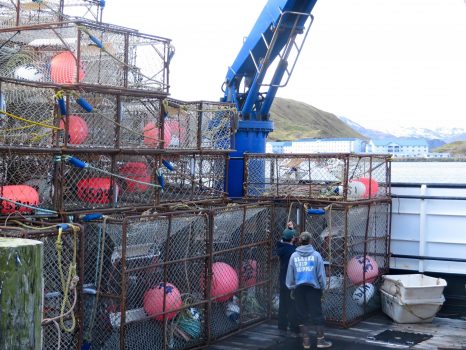
Bristol Bay Red King Crab Fishery Starts Strong Despite Low Stock Assessment
The red king crab fishery is off to a booming start in Bristol Bay, despite predictions of a down season. The fleet has caught two-thirds of its quota in just a dozen days, and managers say fishermen are unloading big, beautiful crab at the dock. Gordon Christiansen is a commercial fisherman with more than 40 years of experience in Bering Sea. This season, he said the crab were especially voracious eaters, quick to fill the pots dropped by his crew on the F/V Aleutian Mariner. “From the time we set pots in the water, we were done in 60 hours,” said Christiansen. “It was amazing, tremendous fishing. We’d like to go out again and do it again tomorrow.” Having already harvested their 120,000-pound allocation, his seven-vessel fleet is finished for the season. The average crab from their haul weighed just over seven pounds — a half-pound larger than normal, according to Christiansen. Read the story here 09:07
The $100 Million U.S. Government Fish Farm Nobody Wants
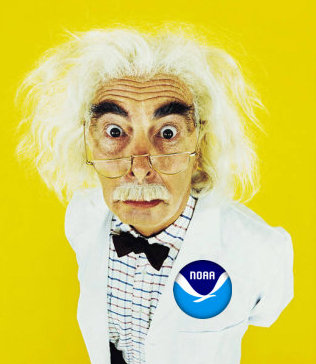 If someone offered you a chance to invest millions of dollars in a business nobody wants, would you take it? If you’re the U.S. government, the answer is a resounding yes. Since 2007, the National Oceanic and Atmospheric Administration—despite major political, social, and environmental headwinds—has poured almost $100 million (PDF) into aquaculture, also known by the more pedestrian moniker of fish farming. Currently, American aquaculture is done only in state waters within a few miles of the coast. (Think farmed salmon.) But the government is trying to go further out to sea, into federal waters, to create an offshore aquaculture industry. After NOAA, under both presidents Barack Obama and George W. Bush tried—and failed—to push national aquaculture legislation through Congress, NOAA decided to do an end run around Capitol Hill, creating a controversial aquaculture permitting system in the Gulf of Mexico that promptly drew litigation as well as the ire of fishermen, boaters, and environmentalists. Read the story here 08:33
If someone offered you a chance to invest millions of dollars in a business nobody wants, would you take it? If you’re the U.S. government, the answer is a resounding yes. Since 2007, the National Oceanic and Atmospheric Administration—despite major political, social, and environmental headwinds—has poured almost $100 million (PDF) into aquaculture, also known by the more pedestrian moniker of fish farming. Currently, American aquaculture is done only in state waters within a few miles of the coast. (Think farmed salmon.) But the government is trying to go further out to sea, into federal waters, to create an offshore aquaculture industry. After NOAA, under both presidents Barack Obama and George W. Bush tried—and failed—to push national aquaculture legislation through Congress, NOAA decided to do an end run around Capitol Hill, creating a controversial aquaculture permitting system in the Gulf of Mexico that promptly drew litigation as well as the ire of fishermen, boaters, and environmentalists. Read the story here 08:33






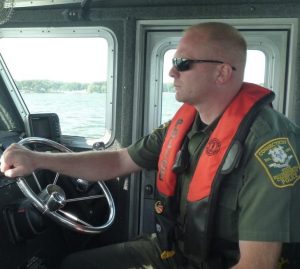 Capt. Keith Williams stated “I’ll check when they’re offloading, doing surprise checks at the dock. We’ll go to the docks in Stonington frequently just to keep them honest, and let them know we’re out there.” (
Capt. Keith Williams stated “I’ll check when they’re offloading, doing surprise checks at the dock. We’ll go to the docks in Stonington frequently just to keep them honest, and let them know we’re out there.” (


























